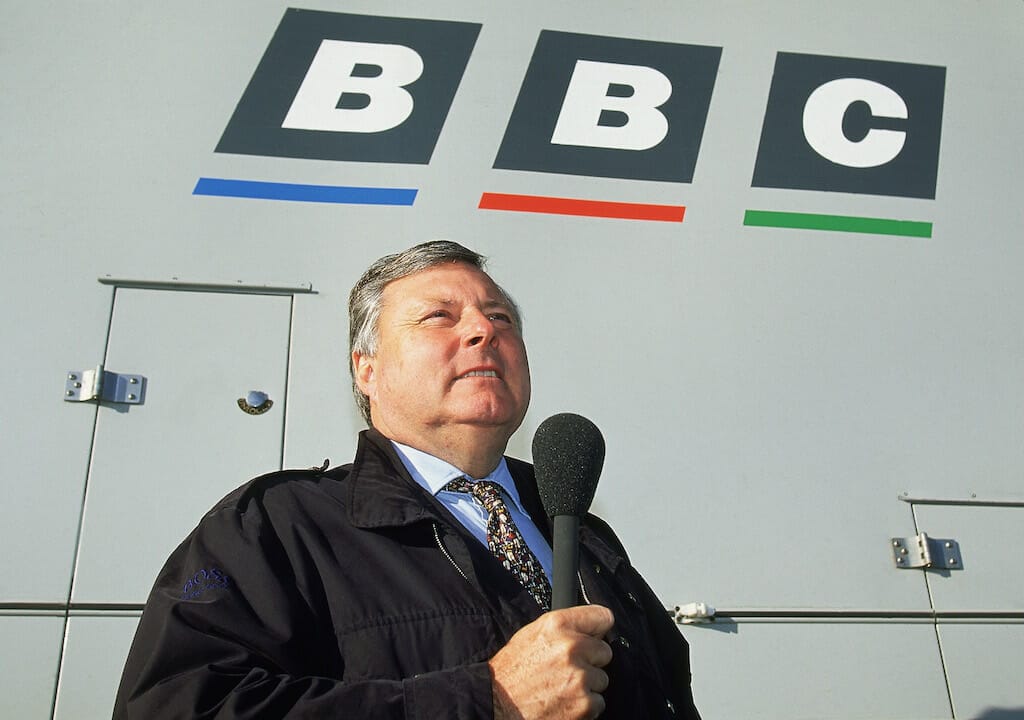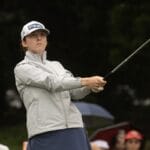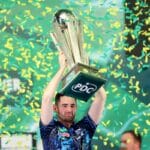Peter Alliss – probably the best commentator in the history of televised golf.
What a sad loss he is to the airwaves and indeed to the golfing scene in general.
Alliss, at heart a professional golfer who knew the game inside out, passed away suddenly on December 5, 2020 aged 89.
We are reminded of the enormous gap left in the firmament of professional golf coverage by the publication of his autobiography: “Peter Alliss: Reflections On A Life Well Lived” (Lennard Publishing).
Alliss and golf writer Bill Elliott, a friend since 1978, had been steadily working on the project for a number of years. Following his death, Peter’s wife Jackie and Elliott made it their goal to complete the book and put it into the public arena.
Its publication was delayed by the Covid pandemic, but will be welcomed by anyone who enjoyed the Alliss brand of off-the-cuff wit and wisdom as a television commentator for almost 60 years.
The former Ryder Cup player’s lifetime encompassed pretty much the entire spectrum of professional golf from the days when the pro was rarely allowed into the clubhouse, through to the Tiger Woods era and the rise of the Young Masters such as Rory McIlroy, Jordan Speith, and Shane Lowry.
In fact, Lowry’s great victory at the 2019 Open in Royal Portrush was the last major tournament attended by Alliss.
The doyen of television commentators passed away before the trauma and nastiness associated with the establishment of LIV Golf, something that is probably better for him, but his views undoubtedly would have been interesting to hear.
Alliss had a unique style, although his observations on the happenings on and around the golf courses at which he commentated were not always appreciated.
For example, his utterances on the meltdown of Jean Van de Velde in The Open Championship at Carnoustie in 1999 caused a media furore.
The Frenchman had The Open in the palm of his hands when he came to the 18th tee with a three-shot lead. As his disastrous finish unfolded and he stepped into the Barry Burn seemingly to attempt a shot from the water, Alliss famously said: “What on earth are you doing? He’s gone ga-ga.
“To attempt to hit the ball out of there is pure madness.”
“Would somebody kindly go and stop him? Give him a large brandy and mop him down.”
Van De Velde finished with a seven to go into a playoff with Scotland’s Paul Lawrie and American Justin Leonard, which Lawrie won.
Next day the papers poured out the vitriol. The Daily Mail called for him to be sacked; the Scottish Daily Record dubbed Alliss a “prattling plonker”.
Van de Velde held no grudges. “He really identified with what happened to me that day and didn’t mean to say it in a bad way.
“He just reacted the way he would have reacted if it had happened to him.
“Only players can appreciate this thing, so I never held anything against Peter.”
Another quip at an Open, this time at St Andrews in 2015 when bad weather forced an extra day’s play, came back to haunt the venerable Alliss.
As the camera focused on the wife of Zach Johnson who was about to hole the putt that would win him the Claret Jug, Alliss delivered a very non-PC observation, “She is probably thinking ‘If this goes in, I get a new kitchen.”
In defence of Alliss, he was aged 84 in 2015. His background was steeped in golf, but it was not golf as the Gen Z and Millennials would know it today.
His family background – dad Percy was one of the best in British golf through the 20s and into the early 30s – bred in him the need to graft and earn your pay as a professional.
“I was very conscious of, and appreciative of, food and new clothes, of not wasting anything, of making do.
“I must have been a 22-year-old before I was invited into the Ferndown clubhouse, and even when I was selected to play in the Ryder Cup match of 1953 I felt odd about using the place,” he recalled.
Peter’s dad Percy, born in 1897, fought in the Great War, and despite being wounded twice, survived the carnage of that abominable representation of man’s inhumanity to man.
Post-war, he established himself as a golf pro.
In 1926 Percy stepped out of his comfort zone to take a job at Wannsee Golf Club in Berlin, having noted that golf professionals were more respected on the continent than in Britain and Ireland, and could charge more for their services.
Alliss wrote: “This was a rather brave (some might say foolish) thing to do when you think how, some ten years earlier, the locals had been the ones taking pot-shots at him on the Western Front. This was an endeavour they had pursued with vigour, and they were rather successful at it, too.”
All was fair in golf and war, however. Percy got on well with most Germans and had a neat trick for any arrogant ‘pupils’ – he would send them away with a massive slice that he reckoned would be incurable.
Peter was thus born in Berlin on February 28, 1931, weighing in at a hefty 14lbs 12oz. His elder brother, Alex, was born in 1924.
The rise of the Nazis in Germany eventually caused Percy and wife Dorothy to plan their exit from the Reich in 1932.
The elder Alliss took jobs at Temple Newsam and Beaconsfield before his appointment as club professional at Ferndown, near Bournemouth in 1938. Ferndown was the place where Peter Alliss honed his game.
At age 14 he played off scratch. At 15 he played for England Boys and reached the semi-final of the Boy’s Championship, losing, much to his chagrin, by 3&2.
Despite the defeat, Percy felt that his son had done enough to join the family business – as an unpaid assistant. Peter declared himself professional, sent his papers to the PGA, and embarked on his new career.
He made his first appearance in The Open aged 16 and his last in 1969. Alliss became one of Britain’s top players, winning 31 tournaments, including a sensational hat-trick of claiming the Italian, Spanish and Portuguese Opens in successive weeks in October 1958.
He played eight times in the Ryder Cup, making his debut in 1953 at Wentworth. His selection meant that he and dad Percy became the first father-son combination to play in the biennial match.
Alliss and Christy O’Connor Senior were on the 1957 Great Britain side – the team only became GB and Ireland in 1973 – which won at Lindrick, thus preventing the dominant Americans from winning the Ryder Cup eight times in succession.
O’Connor and Alliss teamed up for foursomes in the 1959 Ryder Cup and struck up a lasting friendship.
The first venture into television arose by pure chance when he was flying home from finishing tied-second in the 1959 Irish Hospitals Tournament at Woodbrook GC.
Also on the plane and listening with great interest as Alliss regaled fellow professionals and friends with tales and witty observations on the previous week was Ray Lakeland, a senior producer for the BBC.
Lakeland was intrigued and entertained by the banter, and invited Alliss to join the BBC’s coverage of the 1961 Open at Royal Birkdale.
Alliss played in the Open and also got his first taste of life behind the cameras, offering some expert opinion through the week.
That cameo appearance opened the door to an involvement with the BBC golf coverage which lasted 58 years.
Apart from the top tournaments such as The Open Championship and The Masters, Alliss is fondly remembered for ‘Pro Celebrity Golf’ which ran from 1974 to 1988, and ‘Around with Alliss’.
He also designed courses, including The Belfry with Clive Clark, and authored a number of books, while also working with American network ABC and, with his wife Jackie, helping to raise millions of pounds for charity.
His playing career faded in the late sixties and early seventies mainly due to his problems with the putter.
The short stick might have cost him a lot of cash during his playing career but his keen eye for golf and quirky sense of humour entertained and informed millions of viewers for many decades.
One of the classics was at The Open in 1985 at Sandwich, when a streaker broke out of the gallery on the 18th green.
Policemen chased and caught him and one of them covered the streaker’s nether regions with his helmet.
“Well, what a lot of fuss about such a little thing” was the Alliss verdict.
Those morons who shout “Get in the hole!” got short shrift: “Oh, he’s here again. Chloroform, nurse, please.”
Over time, the rise of Sky TV and the enormous sums they invested in golf coverage eventually eclipsed the BBC’s pre-eminence at The Open and The Masters.
It was a source of regret to Alliss but he wrote: “I have to salute Sky for providing a most fantastic golf offering.”
His verdict on some of the prominent Sky commentators was spot on.
“Sky employs a myriad of commentators, some of whom I enjoy and some of whom I find tedious (but, then, many have said that about me).
“The American, Rich Beem, a US PGA champion, is both knowledgeable and entertaining; the Australian Wayne Riley brings an air of mischief and knowledge from the fairways; Richard Boxall’s entertaining style has development well over the years; and Tim Barter has become an accomplished interviewer.
“Meanwhile, Robert Lee and Nick Dougherty have both developed into excellent commentators.”
Golf came easy to him as a player, a trait he recalled in 2012 when inducted into The World Golf Hall of Fame, the first golf commentator to receive that accolade.
“People say, which part of your life did you enjoy the most?
“I’ve enjoyed it all because I’ve never really worked very hard at it, just dear old Gary Player will absolutely guarantee that he never saw me out practicing.
“I used to hit a dozen balls with a 2iron. I was bloody good with a 2iron.
“And the ground was a bit rough. If I hit sort of seven decent ones out of 10, I didn’t see the point in spending all day long hitting any more.”
The Peter Alliss we know and love from his commentaries was one persona; in private life, he had his testing times, just like anyone else.
He married his first wife, Joan, in 1953. They had two children, Gary and Carol, but divorced in 1968.
Four years later Alliss married his second wife, Jackie. They had four children, daughters Sara and Victoria and sons Simon and Henry. Sadly, Victoria was born severely disabled and died in 1983 aged 10.























Leave a comment